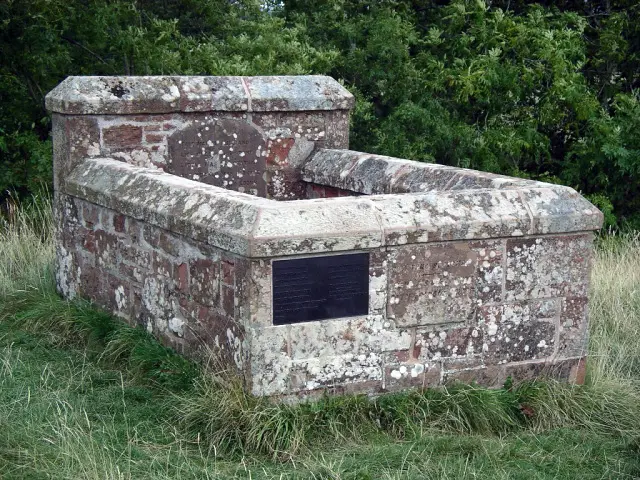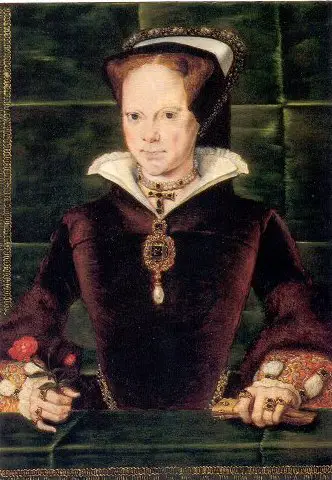 On this day in 1554, Queen Mary I gave a rousing speech at the Guildhall to rally Londoners to her cause and to oppose Wyatt's rebellion. Contemporary John Proctor recorded that Mary "did wonderfullye inamour the heartes of the hearers as it was a world to heare with what shoutes they exalted the honour and magnanimitie of Quene Mary".
On this day in 1554, Queen Mary I gave a rousing speech at the Guildhall to rally Londoners to her cause and to oppose Wyatt's rebellion. Contemporary John Proctor recorded that Mary "did wonderfullye inamour the heartes of the hearers as it was a world to heare with what shoutes they exalted the honour and magnanimitie of Quene Mary".
Mary denounced Thomas Wyatt the Youngerand his rebels, but said that she had sent two of her privy council to "the traitour Wyat, desirous rather to quiete thys tumulte by mercie, then by iustice [justice] of the sworde to vanquishe." She defended her plan to marry Philip of Spain as being beneficial to England, and affirmed:
"For I am alreadie maried to this common weale, and the faythful membres of the same, the spousall ringe whereof I haue on my fynger: which neuer hitherto was nor hereafter shalbe leaft of. Protestinge vnto you nothinge to more acceptable to my hart, nor more aunswerable to my wyl, then youre aduauncement in wealthe and welfare, with the furtheraunce of God's glorye."
John Foxe recorded his version of Mary's speech in his book Actes and Monuments and, again after denouncing the rebels, he has Mary saying:
"I am your Queen, to whom at my coronation, when I was wedded to the realm and laws of the same (the spousal ring whereof I have on my finger, which never hitherto was, not hereafter shall be, left off), you promised your allegiance and obedience to me. And that I am the right and true inheritor of the Crown of this Realm of England, I take all Christendom to witness. My Father, as you all know, possessed the same regal state, which now rightly is descended unto me; and to him always you showed yourselves most faithful and loving subjects, and therefore I doubt not, but you will show yourselves likewise to me, and that you will not suffer a vile traitor to have the order and governance of our person, and to occupy our estate, especially being so vile a traitor as Wyatt is. Who most certainly as he hath abused my ignorant subjects, which be on his side, so doth he intend and purpose the destruction of you, and spoil of your goods. And I say to you, on the word of a Prince, I cannot tell how naturally the mother loveth the child, for I was never the mother of any; but certainly, if a Prince and Governor may as naturally and earnestly love her subjects as the mother doth love the child, then assure yourselves that I, being your lady and mistress, do as earnestly and tenderly love and favour you. And I, thus loving you, cannot but think that ye as heartily and faithfully love me; and then I doubt not but we shall give these rebels a short and speedy overthrow.”
You can read the rest in John Foxe's book at Google Books
Mary's speech was very effective. When Wyatt marched on London he found the city guarded and barricaded. Just a few days after Mary's speech, Wyatt was forced to surrender and he was arrested by Sir Maurice Berkeley and taken to the Tower of London. Click here to read more about the rebellion.
Notes and Sources
- ed. Jeffery, EdwardThe Antiquarian repertory: a miscellaneous assemblage of topography, history..., p. 92-93 in The Historie of Wyate's Rebellion with the Order and Maner of Resisting the same, John Proctor. Google Books
- Foxe, John, Fox's Book of Martyrs; Or, The Acts and Monuments of the ..., Volume I, revised and improved by Rev. John Malham, re-edited by Rev. T. Pratt, 1830, p.162-3. Read at Google Books



Elizabeth is always cited as the Queen who stated she was married to the realm, England, but in fact as above Mary said it first. Yes, Elizabeth did say it, using the ring as well, but she is copying her sister. Mary must have been much more effective as a person and Queen than she is given credence for. It is obvious that it was only by learning from her father and sister and stealing their ideas and speeches that Elizabeth herself became effective as a ruler. Mary appealed to her people and it worked, showing her coronation ring as a wedding ring, just as Elizabeth would do in order to convey an image.